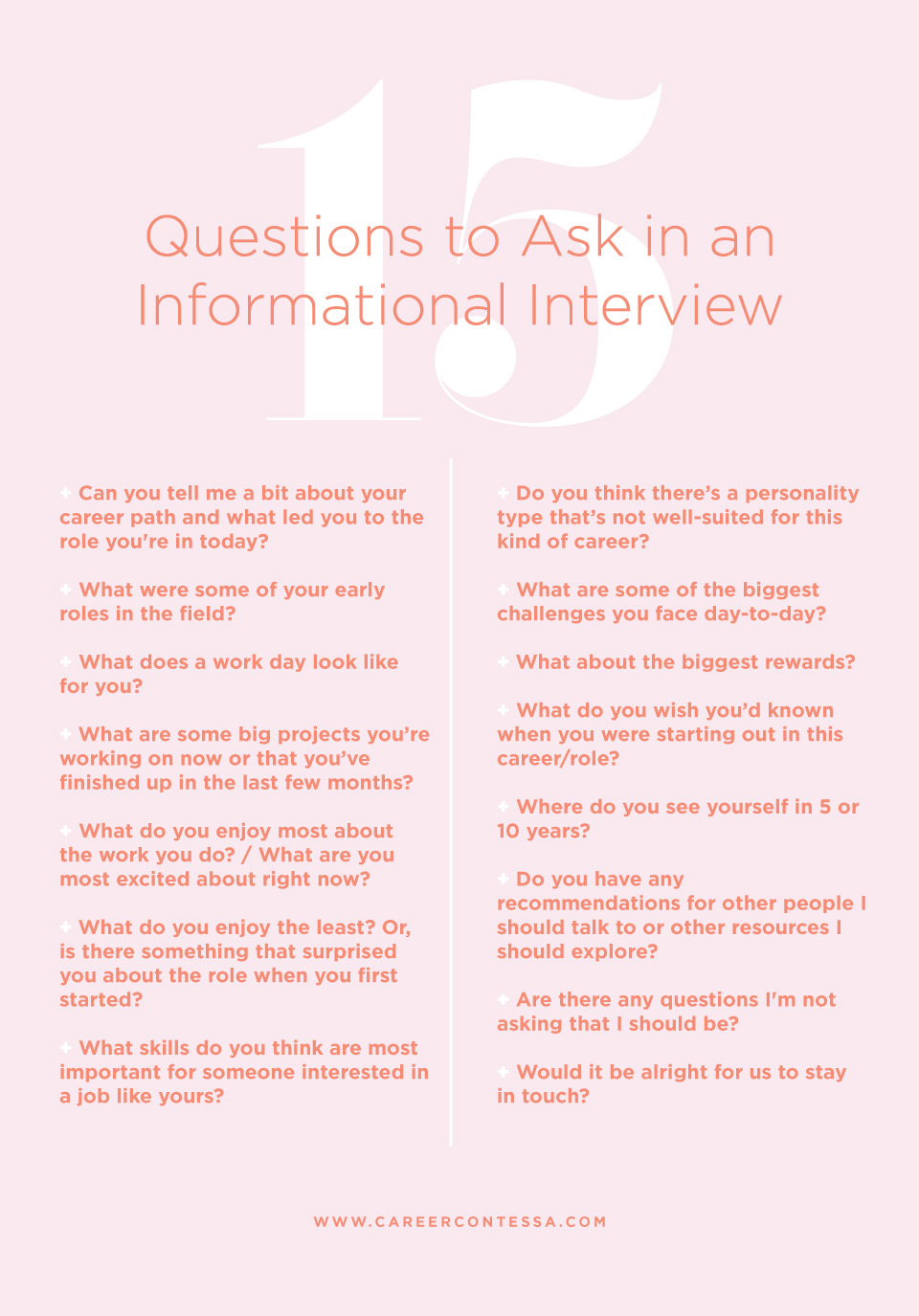Even though it isn't a formal interview, it's still crucial to prepare thoughtful questions to ask in an informational interview.
This is your opportunity to meet with someone you admire (or with someone whose job you admire) and hear their story
without pressing your own onto them.
Informational interviews are an incredible way to get a clear visual of an industry, company, or position to determine if it's right for you.
Plus, he adds, they offer “a way to get yourself known in the hidden job market...The visibility may put you straight onto a shortlist, even if a job isn’t advertised”—or even if you’re not actively job searching.
This means that when done right, informational interviews help you learn—but they also help you
expand your professional network (and, yes, many people have received job offers because of an informational interview they did). So, we’re talking about a win-win situation here.
Below, we’ve explained exactly how to prepare. We cover everything from reaching out to the person you hope to interview to wrapping up the process with a thank-you note.
Plus, we’ve rounded up 15 of our favorite informational interview questions, along with some tips on writing personalized questions for each meeting. And an added bonus is that we added some additional questions for you to ask when you two are really hitting it off at the end!
Table of Contents
How to Prepare for An Informational Interview
Step 1: Find A Specific Person to Interview
If you’re reading this, you may already have someone you’d like to interview in mind. If you’re hoping to find someone for the sake of expanding your network or learning about a role you’re interested in, start with research.
Look up your “dream” companies and read through job titles. Then, conduct a quick internet search (we recommend digging through LinkedIn and Twitter) to learn more about this person's career path.
Step 2: Reach Out
This can be the intimidating part, but don’t stress—
we have a template for that. Now that you’ve thoroughly researched your interviewee, you should have a few tidbits of information that you can use when explaining why you’d like to meet with her for an informational interview. This makes a
cold email feel much more personal and increases the likelihood that she’ll be willing to take the time to meet.
Along the same lines, make sure you’re succinct when you communicate with this person. Assume that she's busy and realize that she's doing you a favor by taking the time to meet with you. (And keep track of time when you’re in the interview itself.)
Step 3: Establish Your Goals
Don’t go into this meeting
unprepared. That would come across as unprofessional, and you want to make a great first impression here.
Rather, before your interview, determine your learning objective for that particular meeting. The research you conducted about this person should help you tailor to their experiences.
Step 4: Prepare your questions.
This leads us to our final point. Prepare interview questions ahead of time so that you can keep the meeting on target, come across as professional, and show the person you’re interviewing that you've done your homework. To that end, let’s get those questions ready.
15 Information Interview Questions to Ask (+ Answers to Look Out For!)
Here are some general questions that should work well, regardless of the industry or the person's professional background. Just make sure that they're relevant to the person by doing thorough research on their work in advance.
Pro Tip: John Lees says not to make your interviewee feel as if you’re “cross-examining them.” We agree: use these questions as a way to guide the conversation, but try not to make them feel as if you’re grilling them.
Informational Interview Question 1: Can You Tell Me About Your Professional Background?
An informational interview is about them, not you, so this is always the best place to start. This will set the tone; they'll understand that you're here to learn from them.
Why You're Asking: By asking this question, you’ll be able to learn the person’s career background. If you’re interested in her role or a similar one, her answer may help you determine a path toward that position. If, for example, she notes that she studied
a particular skill that you haven’t learned yet, you might consider looking into that.
What to Look for in an Answer: Look for the ways in which you could emulate her career path, assuming that you’re interested in a similar role or company. Her educational path, career path, and other anecdotal stories can help you determine the best way forward for your own. If she mentions tangible
professional development suggestions that you’ll need for the role (like specific degrees, certifications, or skills), take note of them.
Informational Interview Question 2: What Were Some of Your Earlier Roles in the Industry?
You'll also want to include the follow-up question: what did you learn there that helps you today? This question is meant to help you get an idea of where you'll need to start if you're new to the field, but it's also a good way to learn more about how linear (or not) this person's career path was.
Why You're Asking: If you’re conducting this informational interview, chances are you're either hoping to
pivot into a new career direction or you're starting out in the workforce. Either way, you stand to learn a lot from this person’s early work experience.
What to Look for in an Answer: Listen for cues as to what served her well when it came to earning the role that she currently occupies. Then, think through how your own career trajectory has started (or is starting) and whether or not it’s leading you to the ultimate role you’re hoping for.
Informational Interview Question 3: What Does Your Typical Workday Look Like?
This is the best chance you'll have to see what every day is like for the role you're interested in. If she says she's working 14-hour days and you're not interested in doing that, you can start looking into other roles.
Why You're Asking: Your career is a big part of your life, and your contentment in your career can
directly affect your overall happiness. We don’t think that your job should be your be-all-end-all, but you certainly want to like what you’ll spend a ton of time doing.
What to Look for in an Answer: Think through your desires for your own future lifestyle. If a 14-hour workday feels like a deal-killer for you, now you’ll know. On the other hand, if that sounds exhilarating to you, you’ll know what to expect and can start working toward that.
Informational Interview Question 4: What Are Some Notable Projects You've Worked On?
Projects are likely what will keep the job interesting, so you want to know what she's been working on. Plus, it will give you a good sense of the priorities of the role and company.
Why You're Asking: This question is likely to get the person talking in detail about her current job and its nuances. From this question, you may learn about her team and details of her role—plus, you'll learn about what a real-life project in that role looks like.
What to Look for in an Answer: Does the project she describes sound interesting to you? Does the team setting she mentions seem like a good fit for your skills and personality? You’ll have a good idea of what the actual job looks like, which will help you determine if it fits you or not.
Informational Interview Question 5: What Do You Enjoy Most About Your Job?
While this question is similar to #4, the answers may not be. What this person enjoys about her work could be completely unexpected. It's a great way to get her to open up more.
Why You're Asking: Like the previous question, this one offers the opportunity for you to see the ins and outs of the position or company more clearly.
What to Look for in an Answer: Listen for things that you also really love. If they say they enjoy the flexibility of their role and a flexible work environment is high on your priority list, then that’s great! If they mention that they enjoy a team environment, and you know you thrive in
a more introverted setting, then you’ll have that information.
Informational Interview Question 6: What Do You Least Enjoy About Your Job?
An informational interview is, after all, a fairly informal conversation. Still, if the person starts to balk about talking about their least favorite element ("I really like everything I do"), you can shift the question to what surprised her instead. Most people have an answer for this.
Why You're Asking: You want to learn all you can about the position, company, or industry you’re interested in, even (or maybe especially!) the negative aspects of it. That way, you’ll be aware of all it encompasses and can move forward sans rose-colored glasses.
What to Look for in an Answer: Honesty! Even if she's uncomfortable mentioning any outright negative aspects of the job or company, she's likely to tell you some items that she found challenging or surprising. You can then take this information and apply it to your own preferences. Would these items be challenging to you? It’s important information to have.
Informational Interview Question 7: What Skills Are Most Important in Your Job?
Take careful note of these, especially the ones you don't technically have. You'll want to use this information to
fill gaps in your skillset before applying for similar jobs.
What to Look for in an Answer: Listen carefully to exactly what she says here. If she says you need to be a master in coding and you're clueless about that, you now know where to start. If she says that the role requires extreme organization and that’s not your strong suit, you'll know to work on that. Knowledge is power.
Informational Interview Question 8: Do You Think There's A Personality Not Well-Suited for This Career?
As she's answering, try to be honest with yourself. If the role requires an "absolutely Type A" personality and you're a dreamer with a capital D, it might not be the right role for you.
Why You're Asking: Ask this question because it’s important to learn what type of personality the role you’re discussing requires. If large group settings are where you thrive and this role is a stationary, lone wolf situation, you might not be as fulfilled as you would be in an outward-facing role.
What to Look for in an Answer: As she describes the
personality traits best suited for this position, think about your own. Do you feel like you align with what she's explaining?
Informational Interview Question 9: What Are the Biggest Challenges You Face?
As you listen, do these challenges excite you? Or do they sound horrible?
Pay attention to any red flags—like references to spending all her time working, "living" at the office, or having found "true family" in coworkers.
While this isn't always a bad sign... it sort of usually is an indicator of a
toxic workplace.
Why You're Asking: This is another question that can help shed light on what the nitty-gritty of the job entails. You should learn more about what to expect when it comes to the role in particular with this answer.
What to Look for in an Answer: Consider this as she answers: do the challenges sound like fun to you? Or do they seem draining?
Informational Interview Question 10: What About the Biggest Rewards?
The answer here might vary from emotional to monetary—so listen carefully and see if the answer gives you a "feel good" vibe.
Why You're Asking: You want to know if the parts of the job that she finds rewarding would also feel rewarding to you. We all derive intrinsic rewards in different ways (
workplace love languages, anyone?) and you want your role to match up with the way you do.
What to Look for in an Answer: As you listen, take note of whether you also find those items rewarding. For example, say you're considering a teaching position because you love to help others. If the person you're interviewing says she finds teaching highly fulfilling because of the relationships she has with her students, you'll know your values align.
Informational Interview Question 11: What Do You Wish You'd Known When Starting Out?
This is one of those *dream* questions that feels scary to ask in a "real" interview setting, but it's perfect for an informational interview setting.
When answered thoughtfully, this question will give you insights only typically achieved through real-life experience. Ask this question!
Why You're Asking: The answer to this question has the potential to offer super valuable insight. They say hindsight is 20/20. Well, this person is offering you their hindsight here.
What to Look for in an Answer: She might mention actionable skills or educational components. She might mention that she wishes she'd spent less time consumed with work and more time focused on balance. She might say she regrets not trying out other career paths. No matter her answer, you stand to gain wisdom from her personal experience, which is invaluable.
Informational Interview Question 12: Where Do You See Yourself in 5 or 10 Years?
You know how people say something like if you can't see yourself in your boss's role, you should quit?
You want this answer to align with your own goals. If you're hoping to stay long-term at a big company, you'll want to hear that she has the same plan. If you'd like to wind up working for yourself someday, it would be good to hear if that's something that she can see herself doing as well.
Why You're Asking: This question also offers the chance to learn what comes next for someone in this role. You might learn from her answer whether you’re interested in climbing that particular ladder or not.
What to Look for in an Answer: Listen for insight into the trajectory of this person’s ultimate career path. Think through whether it sounds like one you’d also like to be on.
Informational Interview Question 13: Do You Recommend That I Speak With Anyone Else?
If you're lucky, she'll introduce you to another contact.
But it's also great to just hear what sites you should be reading or
newsletters you should subscribe to. The goal is to have some ideas of what to read/do/try next.
Why You're Asking: Ask this to get some next-step items to take after your interview. Plus, in your
follow-up thank-you note (that we discuss below) you can mention that you’re loving the book, newsletter, or whatever it is that she recommended to you. Any extra information or resources you can get is good information.
What to Look for in an Answer: Look for either a contact that you can reach out to next, or a list of resources that you can look into. Read the books she recommends. Peruse the sites she says are helpful. Soak up all you can about her position, company, role, or industry.
Informational Interview Question 14: Are There Any Questions I Haven't Asked That I Should be Asking?
Love this question. Sometimes you've missed a big element of the work simply because you didn't ask in quite the right way. See what she says here.
Why You're Asking: This question also serves the purpose of helping you with future informational interviews. If you’re missing some big-picture items, you’ll be better prepared for next time.
What to Look for in an Answer: Take note of any other questions she recommends you ask. She knows much more about the role or industry than you do (that's why you're here, right?), so be sure to jot down what she recommends.
Informational Interview Question 15: Would It Be Okay to Stay in Touch?
Whether that's through LinkedIn or through an occasional email, it's always nice to turn an informational interview into an ongoing networking connection or (ideal scenario) a potential mentor.
Why You're Asking: First, it’s just polite to ask if it’s okay if you continue to correspond with her. Everyone is busy these days, and it’s a courtesy to be clear that you hope to maintain the connection you’ve made.
And if you’re lucky, maybe she'll turn into a mentor—or at least a solid addition to your network.
What to Look for in an Answer: She's likely to agree to this, and if she does, great! You’ve
created a valuable connection. Now it’s up to you to maintain it through regular (but not too regular) correspondence.
Also, Include 3-5 Questions Specific to the Person and Company
We can't stress this enough: beyond the standard informational interview questions, you're going to want to thoroughly research the person you're meeting, as well as their company.
Head to the company website and the person's Linked In. Prepare specific questions about current projects or the person's professional background.
Researching is also a great way to find overlaps in interests—maybe you're both Ohio State alumni or you have a former colleague in common.
Here are a few examples of personal experience questions to ask in an informational interview:
- 1. What parts of your occupation are the most rewarding?
- 2. What made you choose the specific company you're currently working for?
- 3. What specific professional certifications are important to have in your occupation?
- 4. What types of training or professional development opportunities are you currently undertaking or considering?
- 5. What is the office culture like at your workplace? How would you define the dress code?
- 6. Does your job allow you to live the lifestyle you want with regard to work/life balance, vacations, and salary?
- 7. What is the number one piece of advice you'd give a professional starting out on a similar path?
- 8. What kind of traits do you think someone needs to excel in a similar role?
- 9. What entry-level jobs should someone pursue if they were looking to follow a similar career trajectory?
- 10. What is the best educational background to have for a position like yours?
- 11. What professional organizations do you recommend becoming involved with?
- 12. Is your industry growing? What is the employment trajectory for the field as a whole?
- 13. Does your company or industry provide flexibility?
- 14. What types of professional advancement opportunities exist in a role like yours?
- 15. What former jobs of yours helped prepare you the most for your current position? Why?
- 16. What parts of the industry are the most intriguing to you?
- 17. How is your workday typically divided percentage-wise?
- 18. How long does someone generally stay in your current role?
- 19. Does your company and role require mostly in-office or remote work? Do they allow a hybrid work schedule?
- 20. What types of professional benefits does a role or company like yours typically offer?
- 21. What books, resources, or professional journals do you recommend to someone starting her career?
- 22. How do your personality traits fit with your current position?
- 23. If you could go back to the beginning of your career path, what, if anything, would you change?
- 24. What educational majors are the most relevant to your career? Is graduate school generally needed? Do you recommend a specific type of internship experience?
- 25. What other roles are relevant to professionals in your field?
- 26. What are the typical salary ranges for this occupation from entry-level to senior-level?
How to Personalize Your Informational Interview Questions
Here are some topics and ideas to consider, although you should of course think of the questions that are the most useful to you:
- Ask about early internships or roles. ("I saw on LinkedIn that you interned at Google before graduating—did you find that internship helpful for finding jobs later?")
- Ask about volunteer work or professional organizations. ("I noticed you are a member of AIGA—have you found that helpful?")
- Somewhat personal questions are okay as long as you tread lightly. ("I hope you don't mind me asking, but I know you're a working mom. I'd like to have children as well someday. How have you found that navigating a career in this field as a mom?")
Finally, How to Wind Down In a Timely Fashion + Next Steps
Pick and choose the questions that are most important to you, and keep an eye on the time.
Informational interviews are meant to be no longer than 20-25 minutes, so you'll want to find a logical place to cut yourself off if you notice you're running long. Thank her when you're through—and we mean twice.
And make sure to stay in touch if you asked if you could! It's good to set a calendar notification on your phone for one or three months, so you don't forget.











